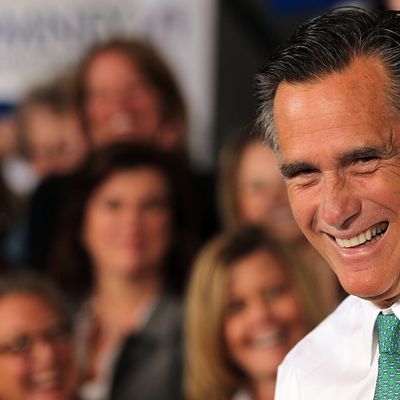
For much of the Clinton and Bush era, “authenticity” was an obsession of the political discourse. Journalists combed through the lives of politicians, generally sweeping aside the things that lay in plain sight, like voting records and platforms, in order to delve into their youthful lives for psychological clues to the genuine self. For various reasons, this method of examination tended to benefit Republican presidential candidates over Democratic ones. Republicans like George W. Bush and John McCain were simple, pure, and honest, and Democrats like Bill Clinton, Al Gore, and John Kerry deemed inauthentic, slippery, hedging, and calculating. The politics of authenticity gained enthusiastic adherents on the right. Conservative writers like Noemie Emery would write endless, scathing dissections of such figures as Gore and Kerry (“The only authentic thing about them was their sense of entitlement,”) in sharp contrast with the genuineness of the Republicans (“authenticity is alive and well, and nowhere more so than at the 2004 Republican convention.”)
Sadly, fate has dealt authenticity-obsessed Republicans the poorest possible hand in this election. They are trying to make the best of it. Emery, for one, has an essay in the current Weekly Standard arguing that authenticity actually doesn’t matter very much. (“The lesson in all of this? That authenticity isn’t always an unalloyed blessing. And that it may be better to be just a touch inauthentic than authentically something that people don’t want.”) What great luck for Romney that this philosophical breakthrough happened to arrive just in time for his general election campaign.
It would be nice if conservatives, for one election cycle at least, continued to treat the once-fashionable authenticity obsession with a little more skepticism. It certainly matters whether politicians consistently hew to a set of convictions. It matters, to be precise, because it helps voters figure out what politicians would do if elected. George H.W. Bush ran in 1988 as an almost fanatically determined opponent of tax hikes. But when circumstances forced him to accept tax hikes in order to avoid fiscal calamity, he accepted them — something his son would never have done. This is the sort of thing you could predict by drilling down into the authentic nature of the politician, his roots, values, and way of thinking of the world.
The question of authenticity comes to bear on Romney because he has adopted such radically different personas. You have to judge Romney by the commitments he’s adopted. If he has promised to use the budget reconciliation bill to repeal Obamacare and to try to pass the Ryan plan within his first 100 days, then that is very likely what he will do. If he is too afraid of social conservatives to stand behind his gay foreign-policy spokesman, then what’s in his heart doesn’t matter. On the other hand, at some point a future President Romney might find himself in different political circumstances, and a different ideological profile might emerge.
What the search for authenticity should not attempt to do is serve as a kind of placeholder for character. That’s the way the concept was used in the Clinton and Bush years. To see why it’s so vacuous, you need look only to John McCain, who was authenticity itself in the eyes of the press corps. McCain was a politician who knew what he believed and said it, whatever the consequences. At least, he did until saying what he thought became a fundamental impediment to his political goal of winning the 2008 Republican nomination. At that point, McCain started wildly hedging and reversing his positions.
The point is that it’s just not useful to try to understand the link between a politician’s moral beliefs and his public conduct as a moral question. Politics is an art. Politicians present themselves to the public as they need to present themselves in order to obtain their goals. Romney has had to wildly reinvent his public persona because he had to win the approval of a liberal Massachusetts electorate in 2002 and then an extremely conservative Republican primary electorate in 2012, not due to any character defect.






























